浙江省杭州市西湖高级中学人教版高中英语必修五课件:unit1 Great Scientists(warming up&reading) (共38张PPT)
文档属性
| 名称 | 浙江省杭州市西湖高级中学人教版高中英语必修五课件:unit1 Great Scientists(warming up&reading) (共38张PPT) | 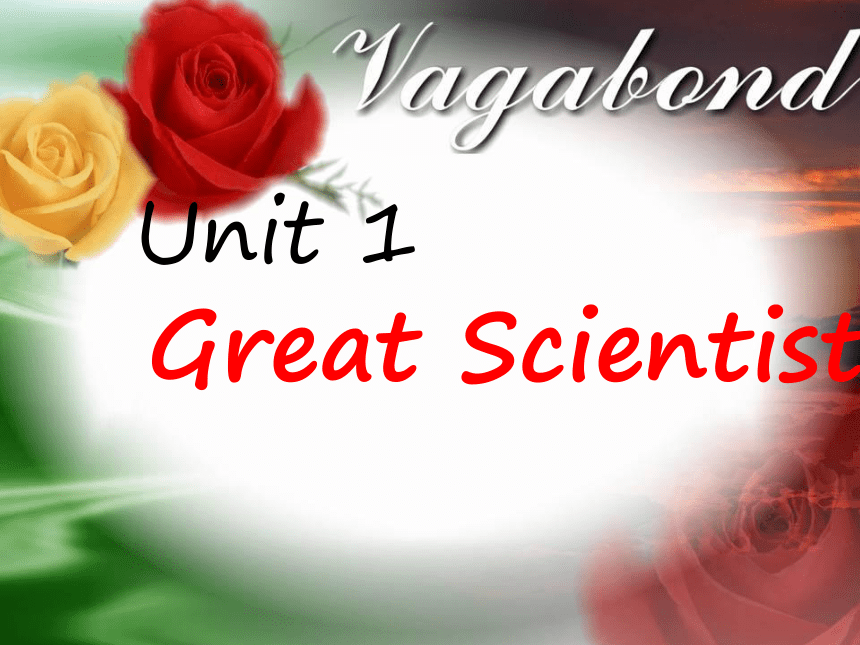 | |
| 格式 | zip | ||
| 文件大小 | 497.2KB | ||
| 资源类型 | 教案 | ||
| 版本资源 | 人教版(新课程标准) | ||
| 科目 | 英语 | ||
| 更新时间 | 2016-04-09 20:40:07 | ||
图片预览

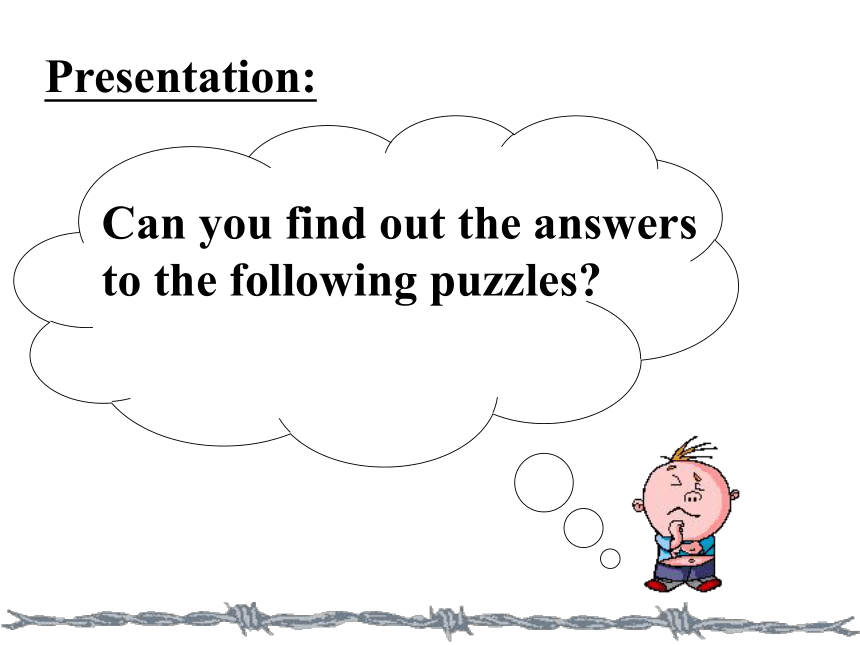
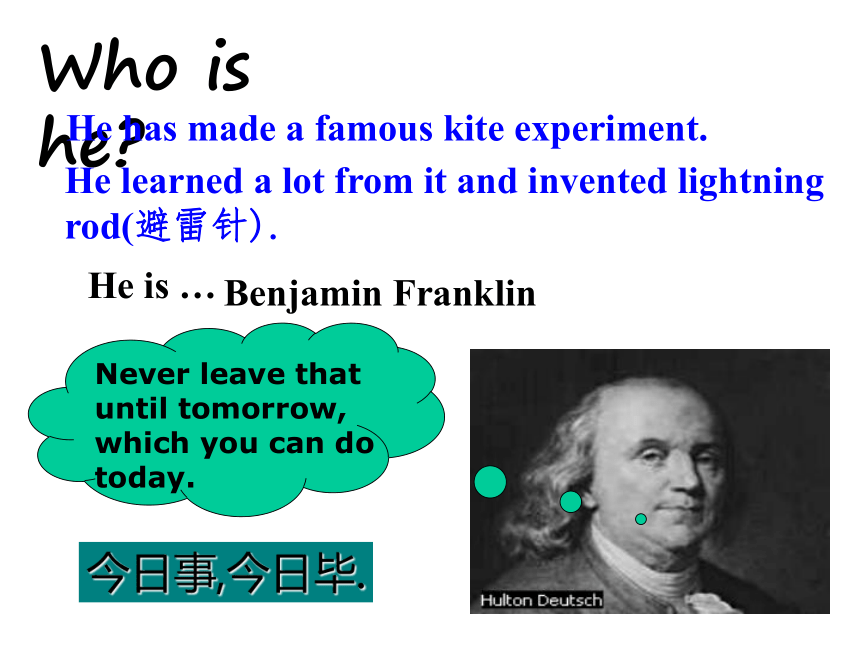
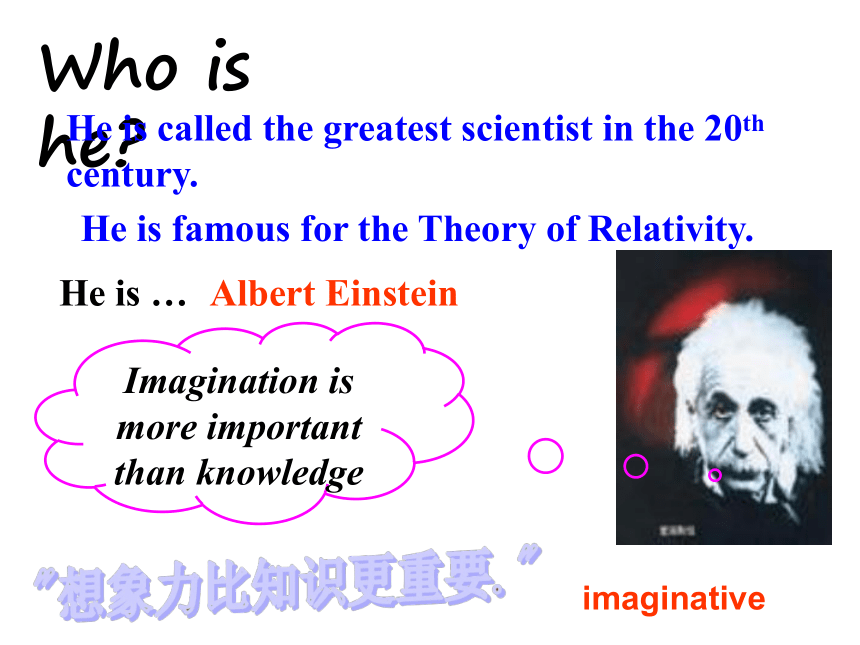
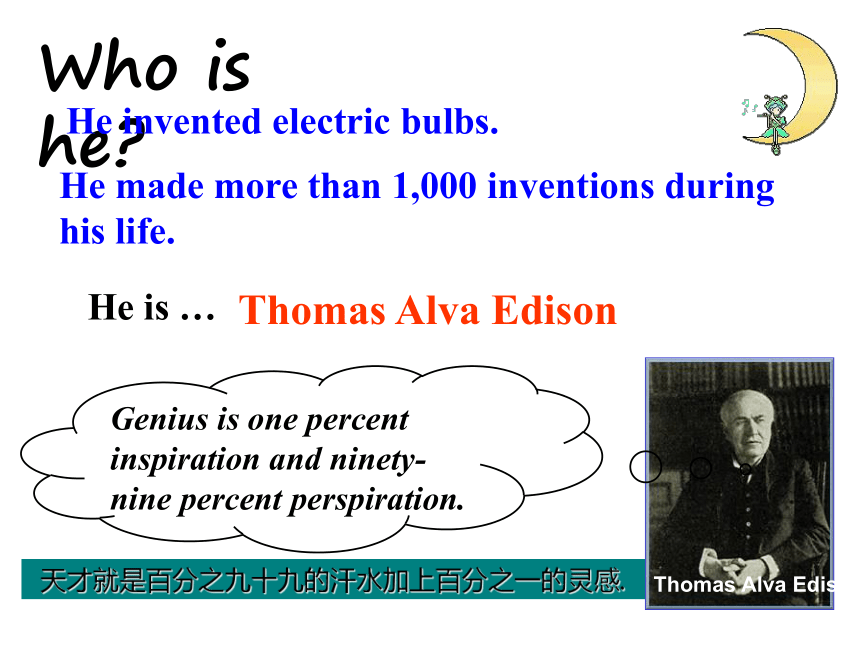
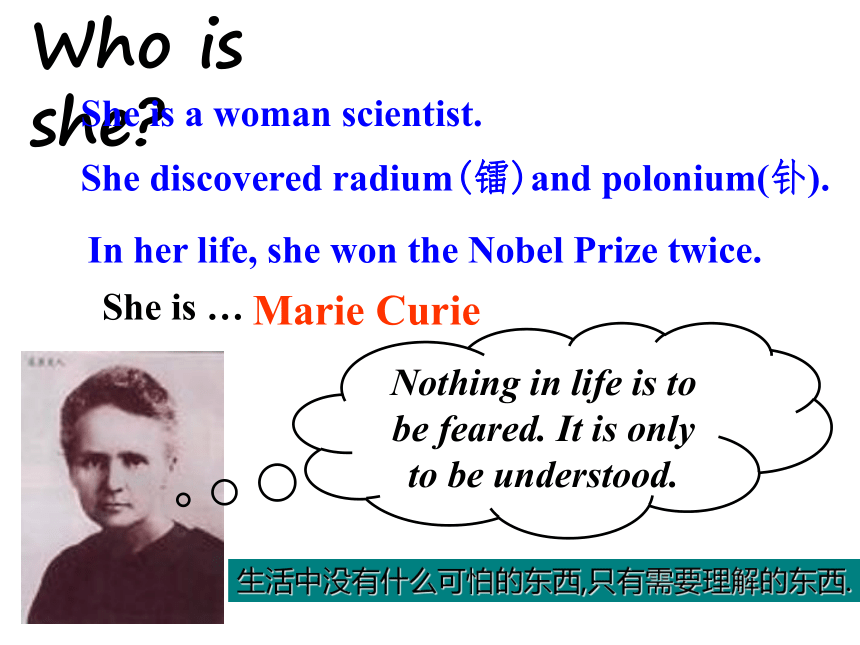
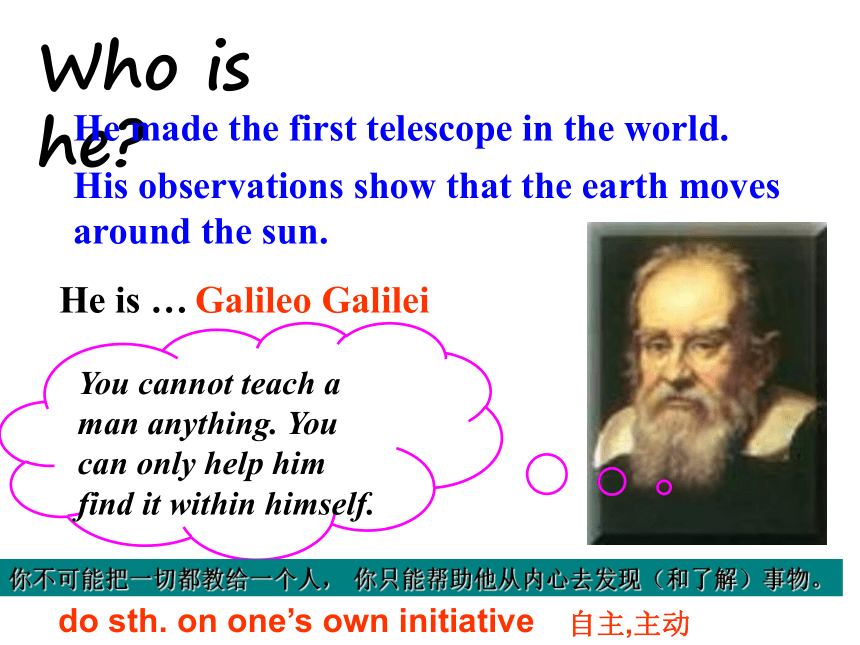
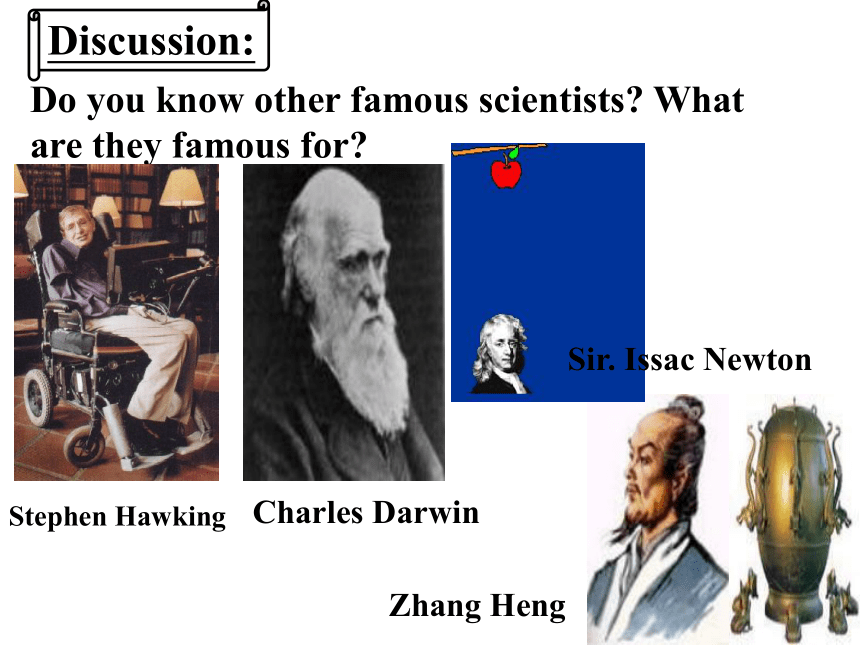
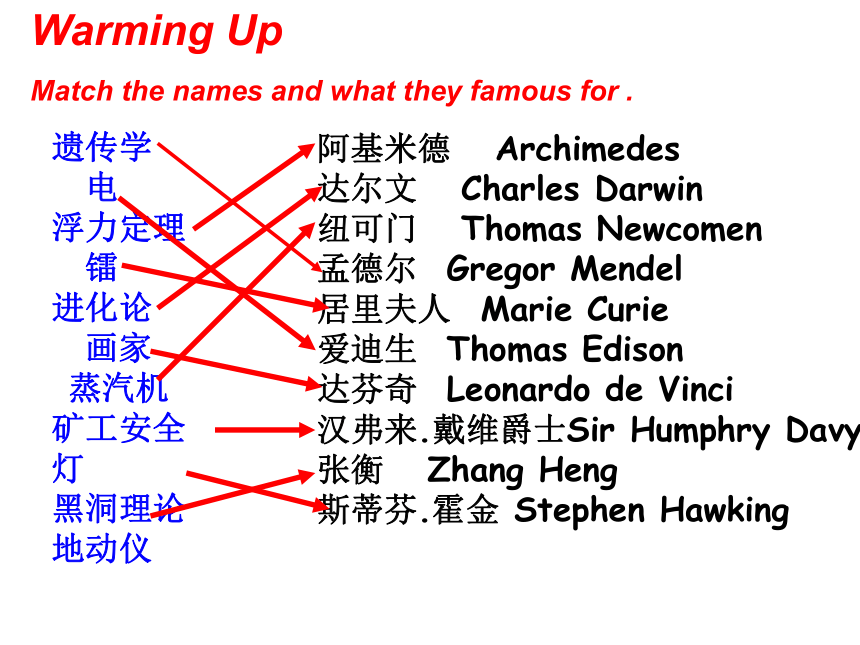
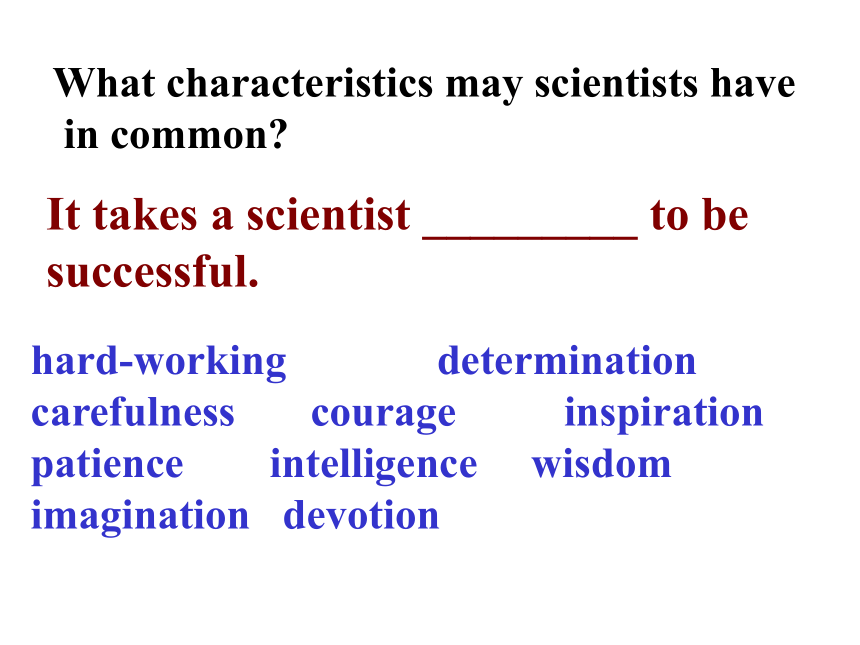
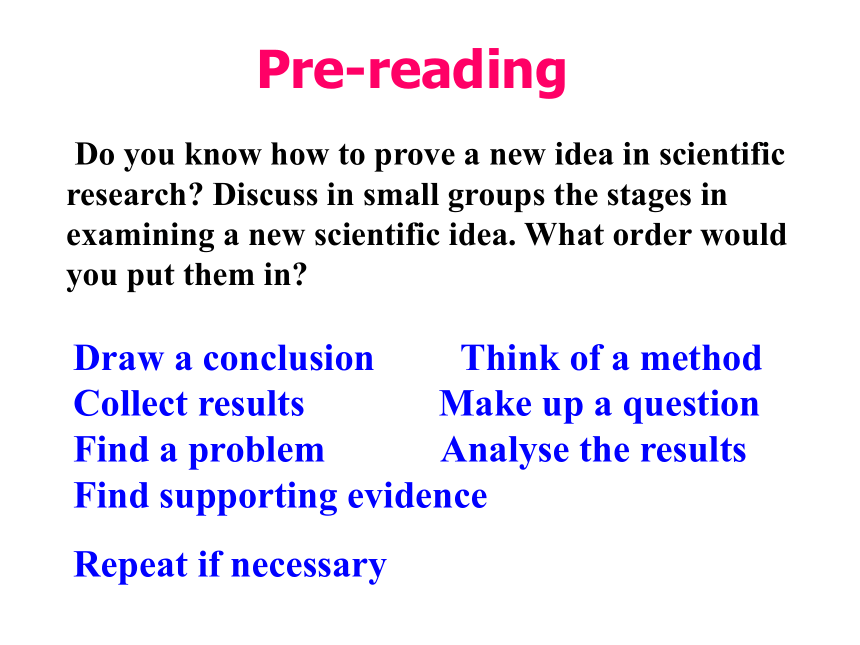
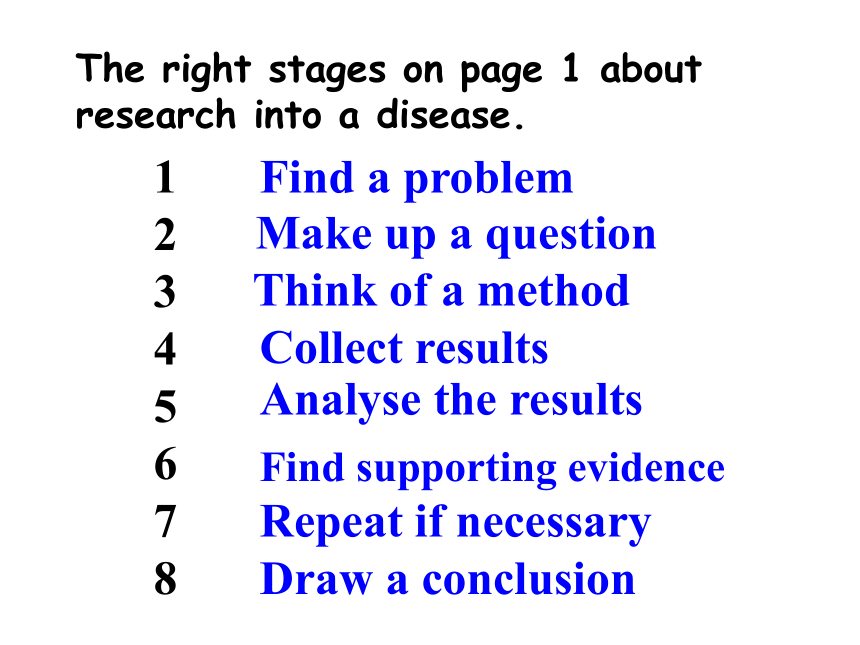
文档简介
课件38张PPT。Great ScientistsUnit 1Presentation:Who is he?He has made a famous kite experiment.He learned a lot from it and invented lightning
rod(避雷针).He is … Benjamin FranklinNever leave that until tomorrow, which you can do today.今日事,今日毕.Who is he?He is called the greatest scientist in the 20th
century.He is famous for the Theory of Relativity.He is … Albert EinsteinImagination is more important than knowledge"想象力比知识更重要."imaginativeWho is he?He invented electric bulbs.He made more than 1,000 inventions during
his life.He is … Thomas Alva EdisonThomas Alva EdisonGenius is one percent inspiration and ninety-nine percent perspiration.天才就是百分之九十九的汗水加上百分之一的灵感.Who is she?She is a woman scientist.She discovered radium(镭)and polonium(钋).
In her life, she won the Nobel Prize twice.She is … Marie CurieNothing in life is to be feared. It is only to be understood.生活中没有什么可怕的东西,只有需要理解的东西.Who is he?He made the first telescope in the world.His observations show that the earth moves
around the sun.He is … Galileo GalileiYou cannot teach a man anything. You can only help him find it within himself.
你不可能把一切都教给一个人, 你只能帮助他从内心去发现(和了解)事物。 do sth. on one’s own initiative自主,主动Do you know other famous scientists? What
are they famous for?Charles DarwinStephen HawkingZhang HengDiscussion:Sir. Issac Newton遗传学
电
浮力定理
镭
进化论
画家
蒸汽机
矿工安全灯
黑洞理论
地动仪
阿基米德 Archimedes
达尔文 Charles Darwin
纽可门 Thomas Newcomen
孟德尔 Gregor Mendel
居里夫人 Marie Curie
爱迪生 Thomas Edison
达芬奇 Leonardo de Vinci
汉弗来.戴维爵士Sir Humphry Davy
张衡 Zhang Heng
斯蒂芬.霍金 Stephen HawkingWarming Up
Match the names and what they famous for .What characteristics may scientists have
in common? hard-working determination
carefulness courage inspiration
patience intelligence wisdom
imagination devotionIt takes a scientist _________ to be
successful.Pre-reading Do you know how to prove a new idea in scientific research? Discuss in small groups the stages in examining a new scientific idea. What order would you put them in?Draw a conclusion Think of a method Collect results Make up a question Find a problem Analyse the results Find supporting evidence
Repeat if necessaryThe right stages on page 1 about research into a disease.1
2
3
4
5
6
7
8Find a problemMake up a questionThink of a methodCollect resultsAnalyse the resultsRepeat if necessaryDraw a conclusionFind supporting evidenceInfectious diseases can be spread to
other people. They have an unknown
cause and need public health care to
solve them. Infectious diseases are difficult to cure. 2. What do you know about infectious diseases? Cholera is the illness caused by a bacterium called Varian cholera. If infects people’s intestines(肠胃), causing diarrhea, vomiting and leg cramps(腹痛).3. What do you know about cholera?The most common cause of cholera is by someone eating food or drinking water that has been contaminated(污染) with the bacteria. Cholera can be mild(不严重的) or even without symptoms(症状), but a severe case can lead to death without immediate treatment.
Find a problem The ________ of cholera causesComprehending Theory two: When people _______ cholera into their bodies with meals, their bodies were attacked and soon they died.Theory one: Cholera ________ in the air and dangerous gas floated around until it found its victims.Make up a question multipliedabsorbedThink of a method To _____ the second theory was correct.proveCollect results Some information was _________ on how many people died and where they got water.Analyse results ________the water to see if that is the cause of the illness. gatheredAnalyseRepeat if necessary With extra _______ , it was announced definitely that _______ water carried cholera.Make a conclusion Polluted water spread cholera. “King Cholera” was _________ .evidencepolluteddefeatedPara 1: Brief introduction of John Snow
and the outbreak of Cholera. John Snow was a famous doctor in
London– so _____ that he ____ Queen
Victoria as her personal ________. But he
became _______ when he thought about
helping ordinary people ______ to
Cholera.expertattendphysicianinspiredexposedPara 2: Two theories about the cause of
Cholera.First: Cholera _________ in the air, _______
around until it found its _________.Second: People ________ this disease into
their bodies with their meals, which ________
the body and soon the _________ person died.multipliedfloatingvictimsabsorbedattackedaffectedPara 3:To prove the second theory was correct.When another outbreak _____ London in
1854 and the disease _________ quickly
through poor ______________, he began to
gather information. In two particular streets,
the cholera outbreak was so ________ that
he was ___________ to find out why.hitspreadneighborhoodsseveredeterminedPara 4: Gather some information on how
many people died and where they got water.Clues: Many of the deaths were near the
water _______ in Broad Street. Some houses
had no deaths. He had not _______ this, so he
made __________ __________. People who
Worked in the pub at 7 Cambridge Street had
been given free beer and had not drunk the
water from the pump. It seemed that _____
______ ______ _____ ________.pumpforeseenfurtherinvestigationsthewaterwastoblamePara 5: Analyse the water to see if that is the
cause of the illness. John Snow _____ _____ the source of the
water, finding that it came from the river
_______ by the dirty water from London.
He told people to ______ the ______ from
the pump. Soon the disease ______ ______. lookedintopollutedremovehandlesloweddownPara 6: He found supporting _________
from two other deaths that were ______ to
the Broad Street outbreak.evidencelinkedA woman and her daughter died after
drinking the water ________ to her house
from the pump. With this extra _______ John
Snow was able to _________ with ________
that polluted water carried the virus.deliveredevidenceannouncecertaintyPara 7: Make a conclusion John Snow suggested that the source of all
the water _______ be __________. The water
companies were __________ not to
____________ people to ________ water
any more.suppliesexaminedinstructedexposepollutedPara 1: Brief introduction of John Snow
and the outbreak of Cholera. Para 2: Two theories about the cause of
Cholera.Para 3:To prove the second theory was
correct.Para 4: Gather some information on how
many people died and where they got water.Para 5: Analyse the water to see if that is the
cause of the illness. Para 6: He found supporting evidence
from two other deaths that were linked to
the Broad Street outbreak.Para 7: Make a conclusionCan you give a brief introduction of John
Snow?2. What were the two possible theories?3. How did he find that the water was to
blame?5. How did he find the supporting evidence?4. How did he prove his finding?6. To prevent this from happening again,
what did Snow suggest? What it takes a scientist to be successful?Do youWhat do you know about Steven Hawking?Instead of giving up, Hawking went on with his
research, got his phD and married Jane. Nor did he
let the disease stop him from living the kind of life he
had always dreamt of. He continued his exploration
of the universe and travelled around the world to give
lectures. In 2002, Hawking visited China and spoke
to university students in Hangzhou and Beijing. As his
disease has disabled him, Hawking has to sit in the
wheelchair and speak through a computer. He told
the students about his theories and thoughts on some
of the greatest questions: What is time, how did the
universe begin, and what exactly are black holes? In 1988, he wrote A Brief History of Time, which
quickly became a best-seller. Readers were pleased
and surprised to find that a scientist could write about
his work in a way that ordinary people could
understand. In the book, he explains both what it
means to be a scientist and how science works. He
tells readers how discoveries are made and how they
change the world. Science, according to Hawking, is
often misunderstood: people often think that science
is about “true” facts that never change. Scientists,
on the other hand, know that their job is never
finished and that even the best theory can turn
out to be wrong.Do you think Steven Hawking deserves to be
respected and admired? Why?When faced with physical problems---
being disabled, he never gives up and
works on.2. He put the theory of black holes. With A
Brief History of Time, he explained science
in a way that ordinary people could
Understand so that science could be
popularized.3. He attaches importance to passing the
scientific thoughts down to the new
generation, trying to expose more young
people to science and attracting more people
to work on science.If you are eager to make a difference and
become a scientist, what should you do
from now on?devote to study more time which you used
to spend on games and entertainment/
amusement 2. read as many science books as possible3. pay attention to problems existing in the
world nowadays, especially environmental
problems and scientific problems4. try to be admitted into a top university
and get further education abroad
rod(避雷针).He is … Benjamin FranklinNever leave that until tomorrow, which you can do today.今日事,今日毕.Who is he?He is called the greatest scientist in the 20th
century.He is famous for the Theory of Relativity.He is … Albert EinsteinImagination is more important than knowledge"想象力比知识更重要."imaginativeWho is he?He invented electric bulbs.He made more than 1,000 inventions during
his life.He is … Thomas Alva EdisonThomas Alva EdisonGenius is one percent inspiration and ninety-nine percent perspiration.天才就是百分之九十九的汗水加上百分之一的灵感.Who is she?She is a woman scientist.She discovered radium(镭)and polonium(钋).
In her life, she won the Nobel Prize twice.She is … Marie CurieNothing in life is to be feared. It is only to be understood.生活中没有什么可怕的东西,只有需要理解的东西.Who is he?He made the first telescope in the world.His observations show that the earth moves
around the sun.He is … Galileo GalileiYou cannot teach a man anything. You can only help him find it within himself.
你不可能把一切都教给一个人, 你只能帮助他从内心去发现(和了解)事物。 do sth. on one’s own initiative自主,主动Do you know other famous scientists? What
are they famous for?Charles DarwinStephen HawkingZhang HengDiscussion:Sir. Issac Newton遗传学
电
浮力定理
镭
进化论
画家
蒸汽机
矿工安全灯
黑洞理论
地动仪
阿基米德 Archimedes
达尔文 Charles Darwin
纽可门 Thomas Newcomen
孟德尔 Gregor Mendel
居里夫人 Marie Curie
爱迪生 Thomas Edison
达芬奇 Leonardo de Vinci
汉弗来.戴维爵士Sir Humphry Davy
张衡 Zhang Heng
斯蒂芬.霍金 Stephen HawkingWarming Up
Match the names and what they famous for .What characteristics may scientists have
in common? hard-working determination
carefulness courage inspiration
patience intelligence wisdom
imagination devotionIt takes a scientist _________ to be
successful.Pre-reading Do you know how to prove a new idea in scientific research? Discuss in small groups the stages in examining a new scientific idea. What order would you put them in?Draw a conclusion Think of a method Collect results Make up a question Find a problem Analyse the results Find supporting evidence
Repeat if necessaryThe right stages on page 1 about research into a disease.1
2
3
4
5
6
7
8Find a problemMake up a questionThink of a methodCollect resultsAnalyse the resultsRepeat if necessaryDraw a conclusionFind supporting evidenceInfectious diseases can be spread to
other people. They have an unknown
cause and need public health care to
solve them. Infectious diseases are difficult to cure. 2. What do you know about infectious diseases? Cholera is the illness caused by a bacterium called Varian cholera. If infects people’s intestines(肠胃), causing diarrhea, vomiting and leg cramps(腹痛).3. What do you know about cholera?The most common cause of cholera is by someone eating food or drinking water that has been contaminated(污染) with the bacteria. Cholera can be mild(不严重的) or even without symptoms(症状), but a severe case can lead to death without immediate treatment.
Find a problem The ________ of cholera causesComprehending Theory two: When people _______ cholera into their bodies with meals, their bodies were attacked and soon they died.Theory one: Cholera ________ in the air and dangerous gas floated around until it found its victims.Make up a question multipliedabsorbedThink of a method To _____ the second theory was correct.proveCollect results Some information was _________ on how many people died and where they got water.Analyse results ________the water to see if that is the cause of the illness. gatheredAnalyseRepeat if necessary With extra _______ , it was announced definitely that _______ water carried cholera.Make a conclusion Polluted water spread cholera. “King Cholera” was _________ .evidencepolluteddefeatedPara 1: Brief introduction of John Snow
and the outbreak of Cholera. John Snow was a famous doctor in
London– so _____ that he ____ Queen
Victoria as her personal ________. But he
became _______ when he thought about
helping ordinary people ______ to
Cholera.expertattendphysicianinspiredexposedPara 2: Two theories about the cause of
Cholera.First: Cholera _________ in the air, _______
around until it found its _________.Second: People ________ this disease into
their bodies with their meals, which ________
the body and soon the _________ person died.multipliedfloatingvictimsabsorbedattackedaffectedPara 3:To prove the second theory was correct.When another outbreak _____ London in
1854 and the disease _________ quickly
through poor ______________, he began to
gather information. In two particular streets,
the cholera outbreak was so ________ that
he was ___________ to find out why.hitspreadneighborhoodsseveredeterminedPara 4: Gather some information on how
many people died and where they got water.Clues: Many of the deaths were near the
water _______ in Broad Street. Some houses
had no deaths. He had not _______ this, so he
made __________ __________. People who
Worked in the pub at 7 Cambridge Street had
been given free beer and had not drunk the
water from the pump. It seemed that _____
______ ______ _____ ________.pumpforeseenfurtherinvestigationsthewaterwastoblamePara 5: Analyse the water to see if that is the
cause of the illness. John Snow _____ _____ the source of the
water, finding that it came from the river
_______ by the dirty water from London.
He told people to ______ the ______ from
the pump. Soon the disease ______ ______. lookedintopollutedremovehandlesloweddownPara 6: He found supporting _________
from two other deaths that were ______ to
the Broad Street outbreak.evidencelinkedA woman and her daughter died after
drinking the water ________ to her house
from the pump. With this extra _______ John
Snow was able to _________ with ________
that polluted water carried the virus.deliveredevidenceannouncecertaintyPara 7: Make a conclusion John Snow suggested that the source of all
the water _______ be __________. The water
companies were __________ not to
____________ people to ________ water
any more.suppliesexaminedinstructedexposepollutedPara 1: Brief introduction of John Snow
and the outbreak of Cholera. Para 2: Two theories about the cause of
Cholera.Para 3:To prove the second theory was
correct.Para 4: Gather some information on how
many people died and where they got water.Para 5: Analyse the water to see if that is the
cause of the illness. Para 6: He found supporting evidence
from two other deaths that were linked to
the Broad Street outbreak.Para 7: Make a conclusionCan you give a brief introduction of John
Snow?2. What were the two possible theories?3. How did he find that the water was to
blame?5. How did he find the supporting evidence?4. How did he prove his finding?6. To prevent this from happening again,
what did Snow suggest? What it takes a scientist to be successful?Do youWhat do you know about Steven Hawking?Instead of giving up, Hawking went on with his
research, got his phD and married Jane. Nor did he
let the disease stop him from living the kind of life he
had always dreamt of. He continued his exploration
of the universe and travelled around the world to give
lectures. In 2002, Hawking visited China and spoke
to university students in Hangzhou and Beijing. As his
disease has disabled him, Hawking has to sit in the
wheelchair and speak through a computer. He told
the students about his theories and thoughts on some
of the greatest questions: What is time, how did the
universe begin, and what exactly are black holes? In 1988, he wrote A Brief History of Time, which
quickly became a best-seller. Readers were pleased
and surprised to find that a scientist could write about
his work in a way that ordinary people could
understand. In the book, he explains both what it
means to be a scientist and how science works. He
tells readers how discoveries are made and how they
change the world. Science, according to Hawking, is
often misunderstood: people often think that science
is about “true” facts that never change. Scientists,
on the other hand, know that their job is never
finished and that even the best theory can turn
out to be wrong.Do you think Steven Hawking deserves to be
respected and admired? Why?When faced with physical problems---
being disabled, he never gives up and
works on.2. He put the theory of black holes. With A
Brief History of Time, he explained science
in a way that ordinary people could
Understand so that science could be
popularized.3. He attaches importance to passing the
scientific thoughts down to the new
generation, trying to expose more young
people to science and attracting more people
to work on science.If you are eager to make a difference and
become a scientist, what should you do
from now on?devote to study more time which you used
to spend on games and entertainment/
amusement 2. read as many science books as possible3. pay attention to problems existing in the
world nowadays, especially environmental
problems and scientific problems4. try to be admitted into a top university
and get further education abroad
